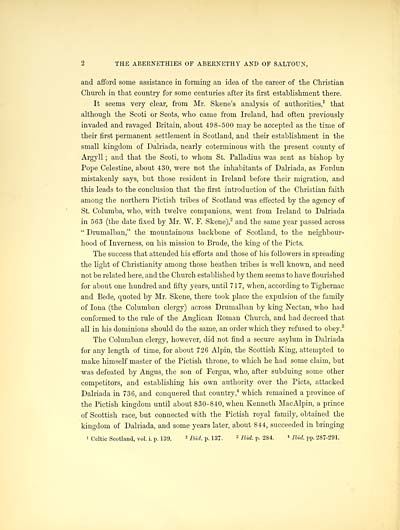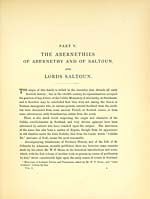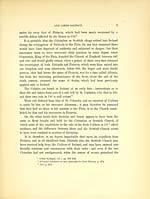Frasers of Philorth > Volume 2
(14)
Download files
Complete book:
Individual page:
Thumbnail gallery: Grid view | List view

2 THE ABERNETHIES OF ABERNETHY AND OF SALTOUN,
and afford some assistance in forming an idea of the career of the Christian
Church in that country for some centuries after its first establishment there.
It seems very clear, from Mr. Skene's analysis of authorities, 1 that
although the Scoti or Scots, who came from Ireland, had often previously
invaded and ravaged Britain, about 498-500 may be accepted as the time of
their first permanent settlement in Scotland, and their establishment in the
small kingdom of Dalriada, nearly coterminous with the present county of
Argyll ; and that the Scoti, to whom St. Palladius was sent as bishop by
Pope Celestine, about 430, were not the inhabitants of Dalriada, as Fordun
mistakenly says, but those resident in Ireland before their migration, and
this leads to the conclusion that the first introduction of the Christian faith
among the northern Pictish tribes of Scotland was effected by the agency of
St. Columba, who, with twelve companions, went from Ireland to Dalriada
in 563 (the date fixed by Mr. W. F. Skene), 2 and the same year passed across
" Drumalban," the mountainous backbone of Scotland, to the neighbour-
hood of Inverness, on his mission to Brude, the king of the Picts.
The success that attended his efforts and those of his followers in spreading
the light of Christianity among those heathen tribes is well known, and need
not be related here, and the Church established by them seems to have flourished
for about one hundred and fifty years, until 717, when, according to Tighernac
and Bede, quoted by Mr. Skene, there took place the expulsion of the family
of Iona (the Columban clergy) across Drumalban by king Nectan, who had
conformed to the rule of the Anglican Boman Church, and had decreed that
all in his dominions should do the same, an order which they refused to obey. 3
The Columban clergy, however, did not find a secure asylum in Dalriada
for any length of time, for about 726 Alpin, the Scottish King, attempted to
make himself master of the Pictish throne, to which he had some claim, but
was defeated by Angus, the son of Fergus, who, after subduing some other
competitors, and establishing his own authority over the Picts, attacked
Dalriada in 736, and conquered that country, 4 which remained a province of
the Pictish kingdom until about 830-840, when Kenneth MacAlpin, a prince
of Scottish race, but connected with the Pictish royal family, obtained the
kingdom of Dalriada, and some years later, about 844, succeeded in bringing
1 Celtic Scotland, vol. i. p. 139. 2 Ibid. p. 137. 3 Ibid. p. 284. 4 Ibid. pp. 287-291.
and afford some assistance in forming an idea of the career of the Christian
Church in that country for some centuries after its first establishment there.
It seems very clear, from Mr. Skene's analysis of authorities, 1 that
although the Scoti or Scots, who came from Ireland, had often previously
invaded and ravaged Britain, about 498-500 may be accepted as the time of
their first permanent settlement in Scotland, and their establishment in the
small kingdom of Dalriada, nearly coterminous with the present county of
Argyll ; and that the Scoti, to whom St. Palladius was sent as bishop by
Pope Celestine, about 430, were not the inhabitants of Dalriada, as Fordun
mistakenly says, but those resident in Ireland before their migration, and
this leads to the conclusion that the first introduction of the Christian faith
among the northern Pictish tribes of Scotland was effected by the agency of
St. Columba, who, with twelve companions, went from Ireland to Dalriada
in 563 (the date fixed by Mr. W. F. Skene), 2 and the same year passed across
" Drumalban," the mountainous backbone of Scotland, to the neighbour-
hood of Inverness, on his mission to Brude, the king of the Picts.
The success that attended his efforts and those of his followers in spreading
the light of Christianity among those heathen tribes is well known, and need
not be related here, and the Church established by them seems to have flourished
for about one hundred and fifty years, until 717, when, according to Tighernac
and Bede, quoted by Mr. Skene, there took place the expulsion of the family
of Iona (the Columban clergy) across Drumalban by king Nectan, who had
conformed to the rule of the Anglican Boman Church, and had decreed that
all in his dominions should do the same, an order which they refused to obey. 3
The Columban clergy, however, did not find a secure asylum in Dalriada
for any length of time, for about 726 Alpin, the Scottish King, attempted to
make himself master of the Pictish throne, to which he had some claim, but
was defeated by Angus, the son of Fergus, who, after subduing some other
competitors, and establishing his own authority over the Picts, attacked
Dalriada in 736, and conquered that country, 4 which remained a province of
the Pictish kingdom until about 830-840, when Kenneth MacAlpin, a prince
of Scottish race, but connected with the Pictish royal family, obtained the
kingdom of Dalriada, and some years later, about 844, succeeded in bringing
1 Celtic Scotland, vol. i. p. 139. 2 Ibid. p. 137. 3 Ibid. p. 284. 4 Ibid. pp. 287-291.
Set display mode to:
![]() Universal Viewer |
Universal Viewer | ![]() Mirador |
Large image | Transcription
Mirador |
Large image | Transcription
Images and transcriptions on this page, including medium image downloads, may be used under the Creative Commons Attribution 4.0 International Licence unless otherwise stated. ![]()
| Histories of Scottish families > Frasers of Philorth > Volume 2 > (14) |
|---|
| Permanent URL | https://digital.nls.uk/96570424 |
|---|
| Attribution and copyright: |
|
|---|---|
| Description | A selection of almost 400 printed items relating to the history of Scottish families, mostly dating from the 19th and early 20th centuries. Includes memoirs, genealogies and clan histories, with a few produced by emigrant families. The earliest family history goes back to AD 916. |
|---|

